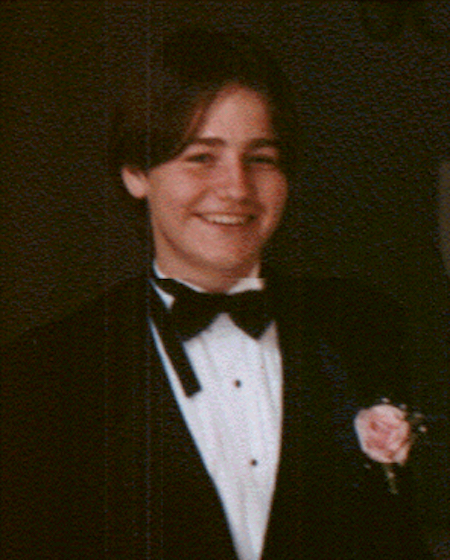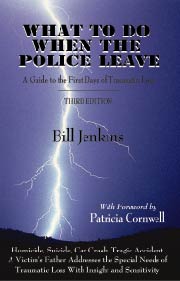
In August 1997, sixteen year-old William Jenkins was on his second day of work at a fast-food restaurant in suburban Richmond, Virginia when the restaurant was robbed at closing time.
While cooperating fully with the robber, William was shot and died instantly. His father, Bill Jenkins, quickly found that there were virtually no readily available resources that could answer his many questions as a survivor of a traumatic loss.
He began looking for help and found it, after a fashion, scattered in the bookstores, on the
Internet, and in support groups and agencies. But nowhere was there a single, concise, practical, and eminently useful resource for bereaved families written by victims for victims containing the advice and guidance that he and his family needed following their loss. Several months later, using the information he had collected for his own personal well-being, this experienced teacher and speaker sat down to write the book that he should have received the night he was notified of his son’s death, What to do When the Police Leave: A Guide to the First Days of Traumatic Loss.
This landmark book on grief and bereavement quickly became an important resource for families dealing with the sudden or traumatic death of a loved one and the caregivers who work with them. Now, a recognized expert on victims and trauma, Bill has served on the boards of directors for Murder Victims for Human Rights, the National Coalition of Victims in Action, and is the founder, along with his wife, Jennifer Bishop, of IllinoisVictims.org, a statewide victim rights watchdog group. He is also active in many other victims’ rights and support activities and organizations, has been an instructor with the Virginia Institute of Forensic Science and Medicine, leads seminars on victims’ perspectives for national organizations such as the National Center for Victims of Crime, the National Organization of Victim Assistance, and Parents of Murdered Children and also addresses local and regional conferences for law enforcement and victim advocates. He and his wife also speak at victim impact panels for youthful offenders and in support of funding for programs for children and young
people that are proven to decrease crime.
In 2006, Bill received the Edith Surgan Victim Activist of the Year award from the National
Organization of Victim Assistance, a singular honor that recognizes to his expertise in the field and his commitment to making society more sensitive to victims’ rights and needs. In 2019, he was awarded the prestigious John Gillis Leadership Award by Parents of Murdered Children.
Bill has also written a full-length play, Hearts Full of Tears, that has been produced by two
professional theatre companies so far. It deals with the emotional struggle of a family dealing with the shooting death of their teen-aged son. Critical and audience reviews have been very positive.
Returning to his educational roots and love of biology, his latest research is in the
neurobiology of trauma and stress, how our brains respond to traumatic experiences, and what
treatments are most helpful to victims and their families. He hopes that his own personal perspective and unique voice using the latest authoritative scientific discoveries will help victims understand how their brains respond to crisis and inform caregivers how best to help trauma victims in their work. Bill is a professional artist and educator at the college level for over 25 years, he currently teaches and designs for the theatre program at Dominican University near Chicago, IL.

You can buy the book What to do When the Police Leave: A Guide to the First Days of Traumatic Loss. By clicking on the title link.
